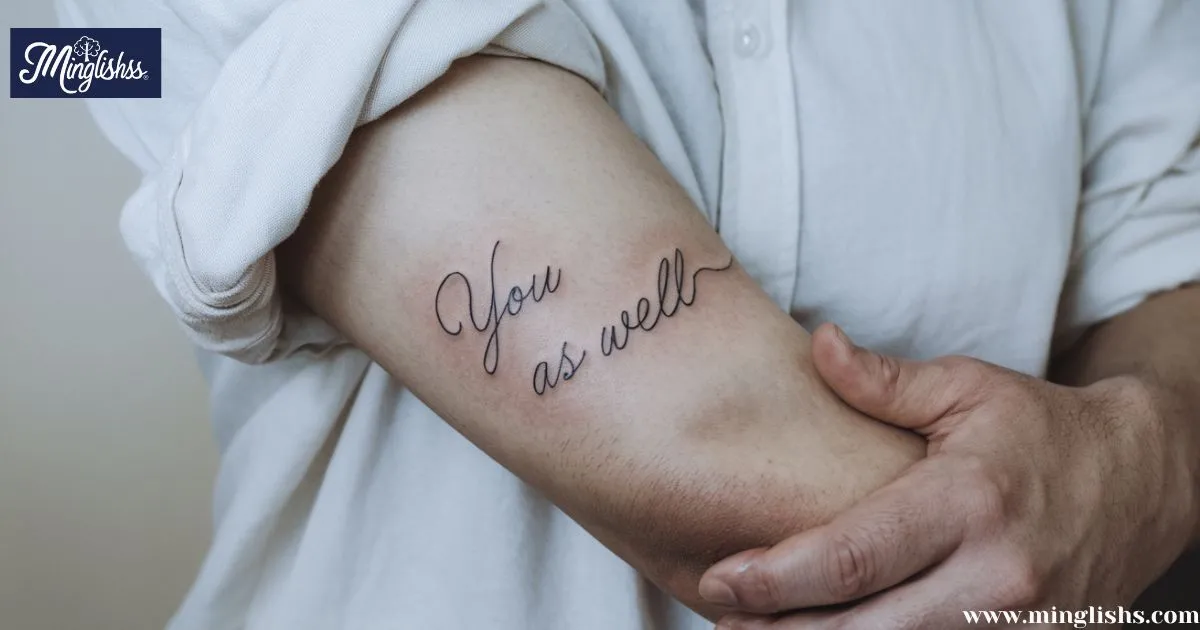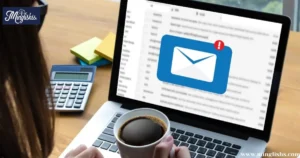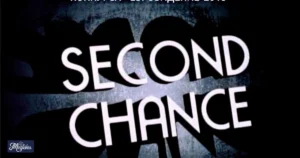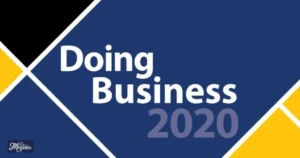“How to say ‘you as well’ in different ways that will help you sound more natural and engaging.”
When having conversations in English, expressing yourself fluently and naturally is key. One common phrase we all use is “you as well,” but sometimes it can feel repetitive or too casual. Whether you’re responding to a compliment or agreeing with someone, there are various ways to say “you as well” to make your communication sound more diverse and engaging. Learning alternative phrases allows you to bring variety to your speech and helps you sound more like a native speaker.
In this blog post, we will dive into 35 different ways to say “you as well” in different situations. Each of these phrases can be used depending on the context of the conversation. This will not only help you expand your vocabulary but also enable you to connect better with others by choosing the right expression for each moment. So, let’s explore all the possible alternatives!
You’ll find that some alternatives fit better in formal settings, while others are casual. Each expression is explained with a scenario, followed by an additional tip for using the phrase. By the end of this blog, you’ll have a whole new set of phrases to use in daily conversations, helping you communicate more naturally and confidently.
35 Ways to Say “You As Well”
1. “Same to you”
Scenario:During a conversation at work, Sarah says, “I hope you have a great weekend.” To reply, John says, “Same to you!”
Explanation:This is a direct way to return a wish or a compliment. It’s an easy way to respond in both informal and semi-formal situations.
Additional Tip:“Same to you” works well in friendly exchanges, like when you’re talking to friends or coworkers. Avoid using it in formal settings like interviews or official meetings.
2. “You too”
Scenario:David tells Emily, “Have a wonderful day!” Emily responds, “You too!”
Explanation:“You too” is a simple and widely used way to reciprocate wishes. It’s casual and works well in most situations.
Additional Tip:It’s best used with friends, family, or colleagues with whom you have a close relationship. It’s a great alternative for informal conversations.
3. “I wish the same for you”
Scenario:Nina tells her friend, “I hope you have a fantastic trip!” Her friend replies, “I wish the same for you.”
Explanation:This phrase conveys a genuine and heartfelt sentiment. It’s slightly more formal than “you too” and works well when you want to express a deeper wish.
Additional Tip:Use this phrase when speaking to someone you care about or in a semi-formal context, like with acquaintances.
4. “Likewise”
Scenario:During a dinner party, Mike says to Laura, “It’s great seeing you again.” Laura responds, “Likewise!”
Explanation:“Likewise” is a short and professional way to express a reciprocal sentiment. It’s ideal when you want to keep it simple.
Additional Tip:“Likewise” is perfect for professional settings or when you’re reconnecting with an acquaintance.
5. “And you”
Scenario:After a chat, Alex says, “It was nice meeting you today!” And Sarah replies, “And you!”
Explanation:This is another informal but effective way to say “you as well.” It’s especially useful in casual conversations.
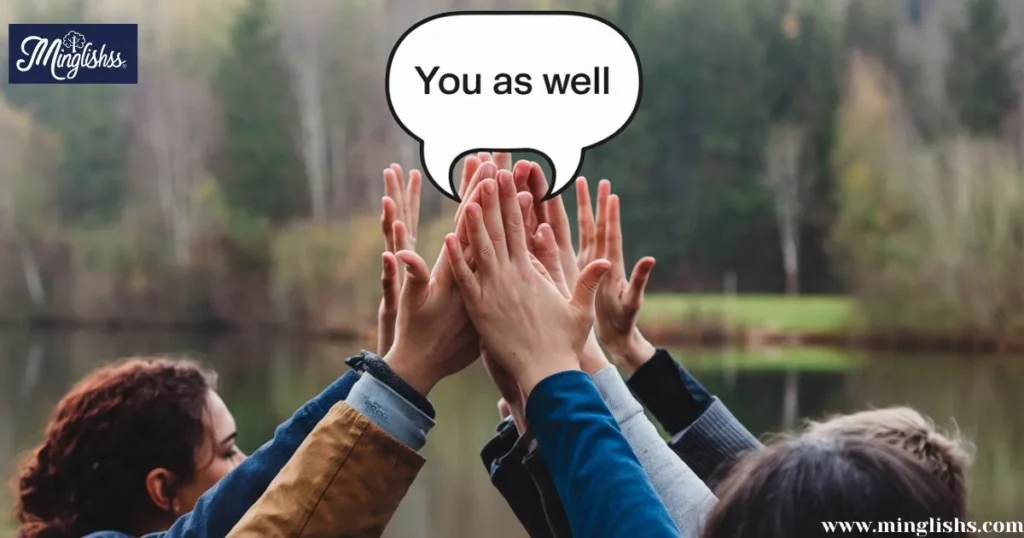
Additional Tip:Although this works in most informal situations, it might not be ideal in formal settings.
6. “Back at you”
Scenario:Tom says to Mary, “Have a great day!” Mary replies, “Back at you!”
Explanation:“Back at you” is a fun and friendly way to return a compliment or wish. It’s commonly used among friends or in light-hearted conversations.
Additional Tip:Avoid using this phrase in professional conversations as it may sound too informal.
7. “Same here”
Scenario:Rachel says, “I hope you feel better soon!” Ben responds with, “Same here!”
Explanation:“Same here” is a quick and friendly way to say “you too.” It’s often used in casual conversations with people you know well.
Additional Tip:It’s best to use “same here” in informal conversations. Avoid using it in formal or business settings.
8. “I feel the same”
Scenario:Liam tells Jessica, “It was a pleasure to meet you.” Jessica responds, “I feel the same.”
Explanation:This phrase conveys mutual appreciation and is perfect for responding to compliments or good wishes.
Additional Tip:“I feel the same” is slightly more personal and may sound more heartfelt than other alternatives.
9. “The same goes for you”
Scenario:Mary tells John, “You always make me laugh!” John responds, “The same goes for you!”
Explanation:This phrase works well when you want to reciprocate someone’s compliment or statement in a genuine and friendly way.
Additional Tip:Use it when you’re feeling particularly enthusiastic or appreciative.
10. “You’re right”

Scenario:In a discussion, Peter says, “I think we need to try a new approach.” Sarah agrees and says, “You’re right, I think so too!”
Explanation:Although slightly different, this phrase can convey agreement or support, similar to saying “you as well” in some scenarios.
Additional Tip:“You’re right” is great for formal conversations or when you want to express that you agree with someone’s point of view.
11. “Ditto”
Scenario:During a meeting, Karen says, “I think this is a great idea!” Brian responds with, “Ditto!”
Explanation “Ditto” is a playful and quick way to say “me too” or “you as well.” It’s informal but friendly.
Additional Tip:It’s best used in informal settings, especially in conversations where humor or informality is encouraged.
12. “I agree”
Scenario:“Great work on the project!” says Mark. Anna replies, “I agree, we did a fantastic job.”
Explanation:This is a straightforward way to express agreement or shared sentiment. It works well in both professional and casual contexts.
Additional Tip:“I agree” is a good alternative when you want to avoid repetitive phrases and offer more clarity.
13. “You bet”
Scenario:Diane tells Greg, “Thanks for helping me with the project!” Greg responds, “You bet!”
Explanation:“You bet” is an enthusiastic way to show that you share the sentiment. It’s a casual and informal expression.
Additional Tip:Avoid using this phrase in formal settings, as it can sound too informal.
14. “Same as you”
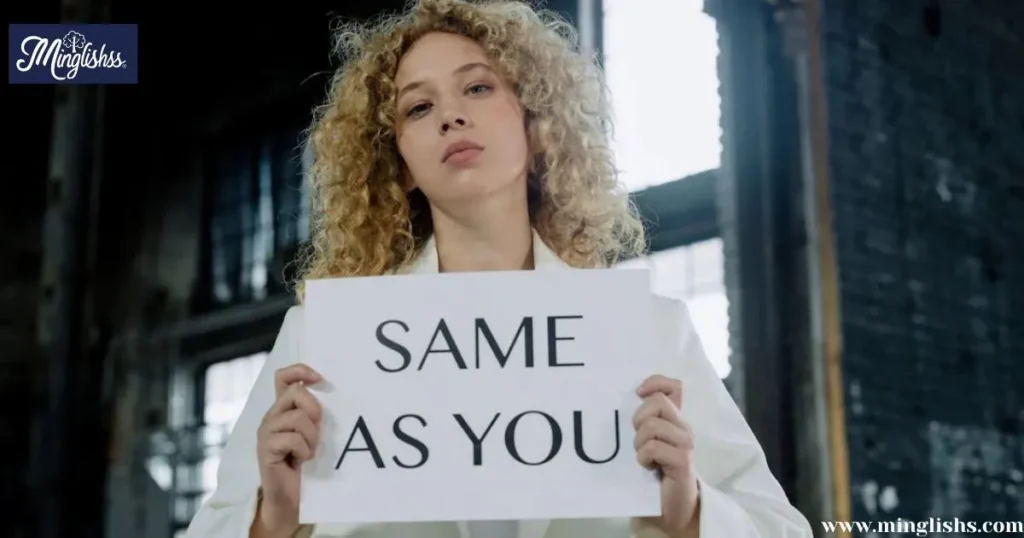
Scenario:In a discussion, Emma says, “I’m excited for the weekend!” Tom responds, “Same as you!”
Explanation:This is another casual and informal way to express the same feeling. It’s a friendly way to show shared excitement or emotions.
Additional Tip:It’s perfect for relaxed conversations, especially when you want to keep things simple.
15. “I echo that”
Scenario:During a team meeting, Jack says, “I believe we can improve our communication.” Lisa responds, “I echo that.”
Explanation:“I echo that” is a formal and polite way to express agreement, often used in professional or formal settings.
Additional Tip:This phrase is ideal when you want to reinforce what someone else has said in a more professional tone.
Other Ways to Say “You Guys”
16. “I couldn’t agree more”
Scenario:Julia tells Ryan, “This project is going to be a success!” Ryan responds, “I couldn’t agree more.”
Explanation:This phrase strongly expresses agreement and is a bit more emphatic than other alternatives.
Additional Tip:Use this in conversations where you want to emphasize how much you agree with someone’s statement.
17. “Absolutely”
Scenario:In a casual discussion, Harry says, “I think this plan will work perfectly!” Sam responds, “Absolutely!”
Explanation:“Absolutely” is a confident and strong way to agree or return a positive sentiment. It conveys certainty and enthusiasm.
Additional Tip:While it’s casual, it’s still strong enough to be used in semi-formal settings.
18. “Exactly”
Scenario:Ava says to Jack, “This is exactly what we needed!” Jack replies, “Exactly!”
Explanation:“Exactly” shows full agreement, and it’s a great way to reinforce someone else’s statement.
Additional Tip:This is a good phrase for both casual and semi-formal conversations where you want to confirm something clearly.
19. “That’s right”
Scenario:Sarah says, “We should try a new approach next time.” Tom responds, “That’s right, let’s do that.”
Explanation:This phrase works well to confirm a statement or idea. It’s simple and effective.
Additional Tip:Use this phrase when you want to sound supportive and agreeable.
20. “For sure”
Scenario:“Let’s grab lunch sometime soon!” says Lisa. “For sure!” replies Brian.
Explanation:“For sure” is a casual, positive expression used to confirm something with certainty. It’s similar to saying “absolutely” or “definitely.” It’s commonly used in informal situations.
Additional Tip:This phrase is best used in relaxed, friendly settings. Avoid using it in formal or professional conversations, as it may come off as too laid-back.
21. “I second that”
Scenario:During a team meeting, Kevin says, “We should focus more on quality than quantity.” Sarah replies, “I second that.”
Explanation:“I second that” is a formal way to show agreement, often used in discussions or meetings. It implies that you fully support the idea or suggestion being made.
Additional Tip:This phrase is best used in formal or professional settings, like in meetings or collaborative discussions.
22. “You’re telling me”

Scenario:Jenny says, “This project is taking forever!” Tom replies, “You’re telling me!”
Explanation:This phrase is a more informal way of showing agreement, especially when the situation is frustrating. It emphasizes that you share the sentiment with the speaker.
Additional Tip:“You’re telling me” is used in casual conversations, especially when you both feel the same frustration or emotion.
23. “I’m with you”
Scenario:In a brainstorming session, Maria says, “We need to improve our strategy moving forward.” John responds, “I’m with you on that.”
Explanation:“I’m with you” is a supportive way to show that you are in agreement with someone’s thoughts or opinions. It works well in both professional and informal conversations.
Additional Tip:This phrase conveys strong support and is often used in teamwork or collaborative environments.
24. “Totally”
Scenario:Rachel says, “I love how the event turned out!” Emily replies, “Totally!”
Explanation:“Totally” is a casual, enthusiastic way to show agreement or confirm something. It expresses full agreement and positivity.
Additional Tip:It works well in informal settings but may sound out of place in formal contexts.
25. “I couldn’t have said it better”
Scenario:Steve says, “We need to be more mindful of our budget going forward.” Laura replies, “I couldn’t have said it better myself.”
Explanation:This is a way to show strong agreement with someone’s statement, particularly when you think they’ve expressed something perfectly.
Additional Tip:Use this phrase when you want to emphasize how much you agree with someone’s opinion or idea, especially in professional discussions.
26. “You make a good point”
Scenario:Sarah says, “Maybe we should consider reducing the cost of production.” Mike responds, “You make a good point.”
Explanation:This phrase is used to acknowledge someone’s valid argument or idea. It’s polite and respectful, making it great for professional or formal conversations.
Additional Tip:
Use it to give someone credit for their thoughts, especially when you are engaged in problem-solving discussions.
27. “I’m on board with that”
Scenario:James says, “Let’s organize the meeting for next week.” Rachel replies, “I’m on board with that.”
Explanation:“I’m on board with that” is a formal way of agreeing to a plan or idea. It signifies that you fully support the proposed action.
Additional Tip:This phrase is most appropriate for professional settings, where you want to express support for a course of action.
28. “Couldn’t agree more”
Scenario:Tom says, “I think we should focus more on customer service.” Lisa replies, “Couldn’t agree more!”
Explanation:This phrase expresses strong agreement, indicating that you completely share the speaker’s opinion. It’s often used to emphasize how much you agree.
Additional Tip:Use it in both formal and informal situations, but especially when you want to add extra weight to your agreement.
29. “You’ve got it”
Scenario:Mark says, “Let’s meet at 3 PM tomorrow.” Amy responds, “You’ve got it.”
Explanation:“You’ve got it” is an informal, enthusiastic way to express agreement or confirm plans. It’s a more casual alternative to phrases like “I’ll do that.”
Additional Tip:This works well in both personal and informal professional settings. Avoid using it in serious or formal business conversations.
30. “I’m all in”
Scenario:John says, “We need to invest in a new marketing campaign.” Kate replies, “I’m all in!”
Explanation:This phrase shows complete commitment or agreement to an idea or plan. It’s often used to indicate enthusiasm and full support.
Additional Tip:Use this in casual conversations or when you want to show strong enthusiasm for an idea or action.
31. “Sounds good to me”
Scenario:After a discussion on the agenda, David says, “How about we finalize this plan?” Jessica responds, “Sounds good to me!”
Explanation:“Sounds good to me” is a casual and positive response indicating that you agree with the proposal. It’s often used in both informal and semi-formal settings.
Additional Tip:This phrase is perfect for suggesting that you have no objections to something, especially when finalizing plans or decisions.
32. “I’m down”
Scenario:Chris says, “Do you want to grab coffee later?” Emma responds, “I’m down!”
Explanation:“I’m down” is an informal, relaxed way to show that you are willing or agree with a suggestion. It’s widely used in casual conversations.
Additional Tip:This phrase should be reserved for informal settings, like with friends or acquaintances.
33. “I’m in agreement”
Scenario:During a discussion, Lisa says, “We need to take a different approach.” Mark replies, “I’m in agreement.”
Explanation:This is a more formal way to express agreement. It works well in professional and formal settings when you want to maintain a respectful tone.
Additional Tip:This phrase is ideal for professional meetings or when you want to make sure your agreement is clear and formal.
34. “I have no objections”
Scenario:During a group discussion, Rachel says, “Let’s go ahead with this plan.” Sam replies, “I have no objections.”
Explanation:This phrase is a polite and formal way to express that you don’t mind a proposal or idea. It’s especially useful when you are agreeing but want to show that you have no concerns.
Additional Tip:Use this in professional environments where you want to show calm acceptance of a decision without being overly casual.
35. “That works for me”
Scenario:After discussing meeting times, Mike says, “How does Thursday at 2 PM sound?” Grace replies, “That works for me.”
Explanation:This is a straightforward and flexible way to show that a suggestion is acceptable to you. It’s appropriate for both casual and business settings.
Additional Tip:Use this phrase when you want to show that the proposal fits well with your schedule or preferences.
Pros and Cons of Using These Alternatives
Pros:
- Variety in Communication: These alternatives help you avoid repetition, making your conversations more engaging.
- Contextual Use: Depending on the formality of the situation, you can choose the most fitting phrase to express agreement or shared sentiment.
- Increased Fluency: Using different phrases helps you sound more like a native speaker and adds natural flow to your speech.
Cons:
- Overuse of Casual Phrases: Some of these alternatives, like “you bet” or “I’m down,” may sound too informal in professional or serious settings.
- Misunderstanding in Certain Contexts: In some cases, less common alternatives may confuse the listener if they’re not familiar with the phrase.
Conclusion
Mastering these 35 alternatives for “you as well” can significantly improve your communication skills. Whether you’re aiming to be more casual, professional, or simply avoid repetition, having a wide range of expressions will make your conversations more engaging and dynamic. With these options, you’ll be able to connect better with others and express yourself in ways that feel natural and fitting for any situation.
Answers to Key Question You As Well
1. What are some casual alternatives to “you as well”?
Some casual alternatives to “you as well” include phrases like “for sure,” “I’m down,” “sounds good to me,” and “I’m all in.” These are informal expressions that are great for conversations with friends or close colleagues.
2. Can I use these alternatives in formal settings?
Yes, but you should choose the right phrase for the situation. For example, “I second that,” “I’m in agreement,” or “I have no objections” are more formal and appropriate for professional settings, meetings, or formal discussions.
3. When should I avoid using these alternatives?
Avoid using casual alternatives like “you’re telling me” or “I’m down” in professional or serious situations. These may come across as too informal and can give the wrong impression in a business or formal context.
4. Which alternatives to “you as well” express strong agreement?
Alternatives like “I couldn’t have said it better,” “I second that,” “totally,” and “you make a good point” show strong agreement and are often used to emphasize support for someone’s opinion or idea.
5. How can using different alternatives improve my communication?
Using different alternatives for “you as well” helps make your conversations more dynamic, natural, and varied. It prevents repetition, enhances your fluency, and allows you to adapt your speech to different levels of formality and familiarity.

Hi, I’m Isabel: I’m passionate about turning language learning into a fun adventure. I believe in making every word exciting and memorable.
